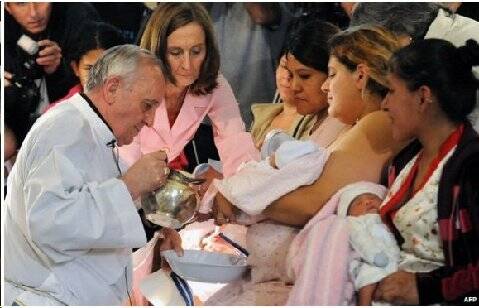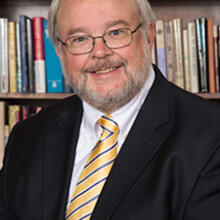As America’s Washington Correspondent I’m supposed to report and comment on what’s going on in Washington. The two dominant stories are the continuing failures of the “Obamacare” web site and U.S. spying on our allies, including the private conversations of heads of state. The White House response to these serious and embarrassing problems is that the president didn’t know what was happening…and that is supposed to be reassuring. Since the president doesn’t know what is happening in Washington at this moment, neither does your Washington Correspondent. So this blog posting is not about faith and politics, but about the sacraments and pastoral care. I have no special expertise in these areas, but that doesn’t seem to be a requirement in parts of the blogosphere (America excepted, of course). So here are a grandfather’s reflections on one baptism and two popes.
Our family spent last weekend in Waynesboro, Virginia for the Baptism of our wonderful granddaughter Anna. I had the great idea that we should travel from Washington to Waynesboro via the Skyline Drive, a splendid journey through mountains and valleys, which is especially beautiful in the fall. There were two problems: a lot of other people had the same idea and the Skyline Drive is a two lane road of more than 100 miles. The three hour drive to Waynesboro became a six hour trek, beautiful but quite long, especially for our two year old grandson Caleb who endured the entire trip looking backwards out of his car seat. Actually, he handled it better than the rest of us. Once we arrived, we had a wonderful time, totally enthralled by the new additions to our family.
We were there to celebrate a sacrament… and it was a wonderful sign of God’s love and grace. I am a grandparent, not a theologian nor a canon lawyer, but I was struck by how much good a welcoming parish and caring pastor can do for evangelization and the renewal of faith. Like many families, we have in-laws and outlaws, with a wide variety of attachments to the Catholic Church. Many are committed lifers, others come and go, some are angry or sad and stay away, and others are indifferent and can’t be bothered. Almost all are impressed and intrigued by the simple ways and powerful words of our new Pope Francis. In light of Pope Francis example, I would trade most evangelization programs for a welcoming parish, a good homily and a caring pastor at times of transition like baptism, but also weddings and funerals. These are not only occasions of grace, but also moments for (re-)evangelization by showing the church at our best as we welcome new members, celebrate new families and say goodbye to people we love.
As I was watching my son and daughter-in-law bring forward their daughter for baptism and hold her as she was marked by water and oil, I thought about some of the controversies over who should receive the sacraments and under what circumstances. I do not believe the sacraments of the church are rewards for good behavior or perfect attendance, but signs of Christ love, care and mercy as we make our way through life. They are also doors that can either open hearts of people to deepen or rediscover faith or doors than can be closed to block or restrict God’s love and the church’s care to a select group.
I acknowledge that for too many, baptism, marriage and funerals can be simply cultural or family rites of passage, empty of religious content or spiritual significance. My wife Linda taught the baptism preparation course in our parish for many years. We know people can approach a parish they have ignored with a sense of entitlement, fear or embarrassment. I sympathize with pastors who celebrate baptisms for families they never see, marriages for people they do not know and funerals for people they never met. However, I also know times when faith has been renewed, a family has been lifted up and people experienced the love of God and his church that make them want to be a part of this community of faith and love. When I speak to priests on the social mission of the church and their ministry, I also plead with them to be open and welcoming to those who only find their way to our door at these moments of passage. (I also ask them to talk to the parish secretary who is the voice and face of the church in these crucial moments.) There are ways to invite, inform and express hopes and expectations for those coming for sacraments, but ‘you are not welcome here’ or Christ’s love doesn’t include you until you register and use your envelopes is not a Catholic message… or a way to the new evangelization.
I take some comfort in knowing that others with more expertise and authority share these concerns and convictions. I am especially impressed how then Cardinal Bergoglio and now Pope Francis has made pastoral practice in this area a core theme of his leadership. We have read the recent story of how he called an abandoned pregnant woman and reassured her that “every child is a blessing.” Worried her child could not be baptized because of her situation, she said the Pope Francis said, “He would be my spiritual father and he would baptize my baby.”
As Archbishop of Buenos Aries in Argentina, Pope Francis shared a similar story:
“I baptized seven children of a woman on her own, a poor widow, who works as a maid and she had had them from two different men. She’d said: Father, I’m in mortal sin, I have seven children and I’ve never had them baptized…She came to see me… After a little catechesis I baptized them in the chapel of the archbishopric. After the ceremony we had a little refreshment. A coca cola and sandwiches. She told me: “Father, I can’t believe it, you make me feel important.”I replied: “But lady, where do I come in? It’s Jesus who makes you important.”
This is not some dramatic new emphasis from Pope Francis, but a reflection of the guidance of Pope Benedict XVI. At a meeting with priests in 2006 he was asked about the practice of not including in first communion families who do not attend Mass regularly and he replied:
When I was young I was rather more severe. I said: the sacraments are the sacraments of the faith, and when the faith isn’t there, where there’s not practice of the faith, the sacraments can’t be conferred…In the course of time I have realized that we have to follow instead the example of the Lord, who was very open also with the people who were at the margins of Israel at that time. He was a Lord of mercy, too open – according to many of the official authorities – with sinners, welcoming them or allowing himself to be welcomed by them at their dinners, drawing them to himself in his communion. Where there is no element of faith…, then it can’t be a sacrament of the faith. But, on the other hand, if we can see even a tiny flame of desire for communion in the church, a desire also from these children who want to enter into communion with Jesus, it seems right to me to be rather generous.
This is a matter of major frustration for our Holy Father and a serious challenge for our church. In one of his morning homilies, Pope Francis shared his frustration with those who turn people away seeking the sacraments with the story of an unmarried mother who goes to a parish to ask for baptism for her child. “What does she find? ‘A closed door,’ as do so many. This is not good pastoral zeal; it distances people from the Lord and does not open doors. So when we take this path...we are not doing good to people, the People of God. Jesus “instituted seven sacraments, and with this approach we institute the eighth, the sacrament of the pastoral customs office,” Francis warned.
As I watched the waters of baptism pour over squirming Anna Catherine Carr, I was grateful she was greeted by a caring pastor, a lively parish and loving family and not the “pastoral customs office” which too often blocks the grace of the sacraments. I was thankful our granddaughter was joining the Church of Jesus Christ which calls us to lives our faith with joy, mercy and welcome for all…And we took the freeway home.








